| Listing 1 - 10 of 30 | << page >> |
Sort by
|
Book
Year: 2019 Publisher: Paris : OECD Publishing,
Abstract | Keywords | Export | Availability | Bookmark
 Loading...
Loading...Choose an application
- Reference Manager
- EndNote
- RefWorks (Direct export to RefWorks)
Radioactive waste repositories are designed to be intrinsically safe in that they are not dependent on the presence or intervention of humans. In response to this challenge, the Nuclear Energy Agency initiated the Preservation of Records, Knowledge and Memory (RK&M) Across Generations Initiative, calling on the international community to help create specific means to preserve RK&M. The concept of a key information file (KIF) emerged in response to the challenge presented by the large volumes of RK&M material generated by national disposal programmes. This concept has been developed into an important component of a RK&M preservation strategy. The KIF is designed to be a single, short document, produced in a standard format, with the aim of allowing society to understand the nature and intent of a repository, and thus to reduce the likelihood of unnecessary human intrusion. It should be made openly available and ultimately be widely distributed. This report describes the KIF concept in detail, in a manner that should enable those concerned with any particular repository to create their own versions. Three draft key information files, currently under development to support RK&M preservation in France, Sweden and the United States, are provided as examples.
Book
ISBN: 1786205017 1786209292 Year: 2023 Publisher: London : Geological Society,
Abstract | Keywords | Export | Availability | Bookmark
 Loading...
Loading...Choose an application
- Reference Manager
- EndNote
- RefWorks (Direct export to RefWorks)
"The option of disposing of radioactive waste deep underground has been studied in Belgium by SCK CEN since the 1970s. This led in 1980 to the construction of the HADES underground research laboratory (URL) in a clay formation, the Boom Clay, at a depth of 225 m under the premises of SCK CEN in Mol. Over the last four decades, many in situ experiments have been conducted in the HADES URL. These have made a significant contribution to ONDRAF/NIRAS' research, development and demonstration (RD&D) efforts demonstrating that disposal in Boom Clay can offer a safe solution for the long-term management of high-level and/or long-lived radioactive waste. Moreover, the construction of the HADES URL itself is a demonstration that shafts and galleries can be constructed in clay at that depth. However, the HADES URL did not only contribute to the Belgian programme. Many of the in situ experiments have been part of international research and the laboratory has provided valuable input to the research programmes of other URLs, such as the Meuse/Haute-Marne URL in France and the Mont Terri rock laboratory in Switzerland. This paper gives a brief overview of the main contributions of the HADES URL to both national and international research into geological disposal"--Abstract.
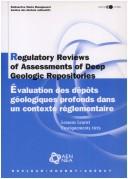
ISBN: 9264058869 9786610033805 1280033800 9264082182 Year: 2000 Publisher: Paris : OECD Publishing,
Abstract | Keywords | Export | Availability | Bookmark
 Loading...
Loading...Choose an application
- Reference Manager
- EndNote
- RefWorks (Direct export to RefWorks)
Integrated performance assessments (IPAs) of radioactive waste repositories deep underground are made at different stages of repository development in order, for example, to allow full-scale development, to provide feedback to R&D, and to test and develop review capability. IPA studies must be acceptable to a wide range of stakeholders and are one of the bases for dialogue amongst regulators and implementers of disposal facilities. The goal of the IPAG-2 study was to examine the experience of regulatory reviews of IPAs, from both the implementer and regulator points of view. Ten implementer and seven regulatory organisations participated. This report presents the lessons learnt from their review experiences, and provides recommendations to aid future regulatory decision making.
Radioactive waste disposal in the ground --- Radioactive waste sites --- Dumping sites, Radioactive --- Radioactive dumping sites --- Radioactive waste disposal sites --- Radioactive waste facilities --- Hazardous waste sites --- Risk assessment --- Risk assessment. --- Geological repositories --- Radioactive waste repositories --- Nuclear waste repositories --- Deep geologic repositories --- Deep geologic disposal --- Radioactive waste sites. --- Radioactive waste repositories. --- Geological repositories. --- Geology --- Radioactivity
Book
ISBN: 9789264274150 Year: 2017 Publisher: Paris : OECD Publishing,
Abstract | Keywords | Export | Availability | Bookmark
 Loading...
Loading...Choose an application
- Reference Manager
- EndNote
- RefWorks (Direct export to RefWorks)
Radioactive waste repositories. --- Radioactive waste disposal in the ground. --- Burial of radioactive wastes --- Ground radioactive waste disposal --- Underground radioactive waste disposal --- Hazardous waste sites --- Waste disposal in the ground --- Radioactive waste repositories --- Nuclear waste repositories --- Geological repositories --- Radioactive waste sites --- Radioactive waste disposal in the ground

ISBN: 1280034459 9786610034451 9264193537 9264187227 Year: 2001 Publisher: Paris : OECD Publishing,
Abstract | Keywords | Export | Availability | Bookmark
 Loading...
Loading...Choose an application
- Reference Manager
- EndNote
- RefWorks (Direct export to RefWorks)
Analysis of the long-term safety of radioactive waste repositories, using performance assessment and other tools, is required prior to implementation. The initial stage in developing a repository safety assessment is the identification of all factors that may be relevant to the long-term safety of the repository and their combination to form scenarios. This must be done in a systematic and transparent way in order to assure the regulatory authorities that nothing important has been forgotten. This report is a review of developments in scenario methodologies based on a large body of practical experience in safety assessments. It will be of interest to radioactive waste management experts as well as to other specialists involved in the development of scenario methodologies.
Radioactive waste disposal in the ground -- Risk assessment -- Congresses. --- Radioactive waste disposal in the ground -- Risk assessment. --- Radioactive waste disposal in the ground. --- Radioactive waste repositories -- Congresses. --- Radioactive waste repositories. --- Radioactive waste disposal in the ground --- Radioactive waste repositories --- Environmental Engineering --- Civil & Environmental Engineering --- Engineering & Applied Sciences --- Risk assessment --- Nuclear waste repositories --- Burial of radioactive wastes --- Ground radioactive waste disposal --- Underground radioactive waste disposal --- Geological repositories --- Radioactive waste sites --- Hazardous waste sites --- Waste disposal in the ground --- Radioactive Safety --- Déchets radioactifs --- Dépôts de déchets radioactifs --- Congresses --- Elimination dans le sol --- Evaluation du risque --- Congrès
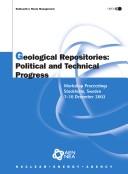
ISBN: 1281754382 9786611754389 9264008314 9789264008311 9264008306 Year: 2005 Publisher: Paris, France : Nuclear Energy Agency, Organisation for Economic Co-operation and Development,
Abstract | Keywords | Export | Availability | Bookmark
 Loading...
Loading...Choose an application
- Reference Manager
- EndNote
- RefWorks (Direct export to RefWorks)
This conference proceedings brings together the latest knowledge on political and technical progress in geological repositories for radioactive waste. It presents perspectives from a variety of countries and stakeholders, examines international instruments being used to facilitate the implementation of geological repositories, and assesses scientific progress and pending technical issues.
Disposicio ́n de residuos radiactivos -- Congresos. --- Disposicio ́n de residuos radiactivos en la tierra -- Congresos. --- Radioactive waste disposal in the ground -- Congresses. --- Radioactive waste repositories -- Congresses. --- Radioactive waste repositories --- Radioactive waste disposal in the ground --- Civil & Environmental Engineering --- Environmental Engineering --- Engineering & Applied Sciences --- Nuclear waste repositories --- Geological repositories --- Radioactive waste sites --- Sweden --- Dépôts de déchets radioactifs --- Déchets radioactifs --- Congresses. --- Congrès --- Elimination dans le sol
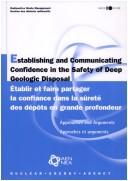
ISBN: 9264097821 9786610033874 1280033878 9264094458 Year: 2002 Publisher: Paris : OECD Publishing,
Abstract | Keywords | Export | Availability | Bookmark
 Loading...
Loading...Choose an application
- Reference Manager
- EndNote
- RefWorks (Direct export to RefWorks)
Confidence among both technical experts and the public in the safety of deep geologic repositories for radioactive waste is a key element in the successful development of the repositories. This report presents the approaches and arguments that are currently used in OECD countries to establish and communicate confidence in their safety. It evaluates the state of the art for obtaining, presenting and demonstrating confidence in long-term safety, and makes recommendations on future directions and initiatives to be taken for improving confidence.
Afval --- Kernenergie --- Stralingen --- Déchets --- Energie nucléaire --- Radiations --- Radioactive waste disposal in the ground --- Radioactive waste sites. --- Déchets radioactifs --- Dépôts de déchets radioactifs --- Risk assessment --- Elimination dans le sol --- Evaluation du risque --- Deep geologie disposal --- Radioactive waste repositories --- Radioactive waste sites --- Dumping sites, Radioactive --- Radioactive dumping sites --- Radioactive waste disposal sites --- Radioactive waste facilities --- Hazardous waste sites --- Nuclear waste repositories --- Geological repositories --- Monograph --- E-books --- Radioactive waste repositories. --- Deep geologie disposal. --- Risk assessment. --- Deep geologic disposal. --- Deep geologic waste disposal --- Deep geological disposal --- Hazardous wastes --- Waste disposal in the ground
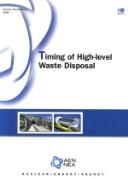
ISBN: 1281720003 9786611720001 9264046267 9264046259 Year: 2008 Publisher: Paris : Nuclear Energy Agency, Organisation for Economic Co-operation and Development,
Abstract | Keywords | Export | Availability | Bookmark
 Loading...
Loading...Choose an application
- Reference Manager
- EndNote
- RefWorks (Direct export to RefWorks)
This study identifies key factors influencing the timing of high-level waste (HLW) disposal and examines how social acceptability, technical soundness, environmental responsibility and economic feasibility impact on national strategies for HLW management and disposal. Based on case study analyses, it also presents the strategic approaches adopted in a number of national policies to address public concerns and civil society requirements regarding long-term stewardship of high-level radioactive waste. The findings and conclusions of the study confirm the importance of informing all stakeholders and involving them in the decision-making process in order to implement HLW disposal strategies successfully.
Deep geologic disposal. --- Radioactive waste disposal. --- Radioactive waste repositories. --- Radioactive waste disposal --- Deep geologic disposal --- Radioactive waste repositories --- Civil & Environmental Engineering --- Engineering & Applied Sciences --- Environmental Engineering --- Government policy --- Government policy. --- Nuclear waste repositories --- Deep geologic waste disposal --- Deep geological disposal --- Nuclear waste disposal --- Geological repositories --- Radioactive waste sites --- Radioactive waste disposal in the ground --- Hazardous wastes --- Waste disposal in the ground --- Nuclear engineering --- Radioactivity --- Refuse and refuse disposal --- Radioactive pollution --- Safety measures --- Belgium --- Canada --- Czech Republic --- European Union --- France --- Germany --- Japan --- Korea, Republic of --- Sweden --- United States
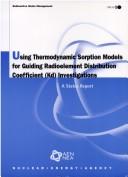
ISBN: 1280034416 9786610034413 926419293X 9789264192935 9264186794 Year: 2001 Publisher: Paris : OECD Publishing,
Abstract | Keywords | Export | Availability | Bookmark
 Loading...
Loading...Choose an application
- Reference Manager
- EndNote
- RefWorks (Direct export to RefWorks)
A general consensus has been reached among technical experts that high-level radioactive waste can safely be disposed of in deep geological repositories. Safety studies are carried out to evaluate the overall capacity of a particular disposal site to confine waste and minimise radioactive releases. Since the principal way in which radioactive elements might eventually reach the biosphere is by transport of dissolved radionuclides in groundwater, the safety study calculations must be able to estimate their rate of transfer through each of the barriers surrounding the repository. It is well known that, for many radioelements, sorption reactions can lead to a reduction of the amount of radionuclides present in the solution phase. How best to take radionuclide sorption reactions into account in repository performance assessment models is the subject of this book.
Radioactive waste disposal in the ground. --- Radioactive waste management. --- Radioactive waste. --- Radioactive waste disposal in the ground --- Environmental Engineering --- Civil & Environmental Engineering --- Engineering & Applied Sciences --- Burial of radioactive wastes --- Ground radioactive waste disposal --- Underground radioactive waste disposal --- Hazardous waste sites --- Waste disposal in the ground --- Radioactive waste repositories --- Radioactive Waste --- Déchets radioactifs --- Elimination dans le sol
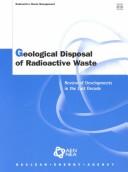
ISBN: 9246180542 128003419X 9786610034192 9246180540 9264171940 Year: 1999 Publisher: Paris : OECD Publishing,
Abstract | Keywords | Export | Availability | Bookmark
 Loading...
Loading...Choose an application
- Reference Manager
- EndNote
- RefWorks (Direct export to RefWorks)
The concept of removing long-lived radioactive wastes from the human environment by disposal in deep geological repositories was developed several decades ago. In the intervening years, research efforts world-wide have increased our knowledge and understanding of how underground disposal systems will function over very long periods of time. Significant progress has also been made towards implementation of such facilities. There have, however, been delays in the disposal programmes of several countries. This report is a review of developments in the past decade. The primary sources of information are the answers to a questionnaire provided by waste management organisations represented in the NEA Radioactive Waste Management Committee (RWMC). The latter is an international forum of senior specialists from safety authorities, waste management agencies, R&D institutions and policy-making bodies.
Geological repositories. --- Radioactive waste disposal in the ground. --- Seepage. --- Radioactive waste disposal in the ground --- Environmental Engineering --- Civil & Environmental Engineering --- Engineering & Applied Sciences --- Burial of radioactive wastes --- Ground radioactive waste disposal --- Underground radioactive waste disposal --- Hazardous waste sites --- Waste disposal in the ground --- Radioactive waste repositories --- Déchets radioactifs --- Elimination dans le sol --- Radioactive Waste Storing
| Listing 1 - 10 of 30 | << page >> |
Sort by
|

 Search
Search Feedback
Feedback About UniCat
About UniCat  Help
Help News
News